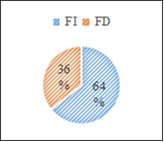Covariational reasoning of field dependent prospective mathematics teacher in solving covariance problem
DOI:
https://doi.org/10.23917/jramathedu.v8i3.4740Keywords:
Coordinating aspect, Construction Aspect, Covariational Reasoning, Covariation problem, Field dependentAbstract
This study aims to analyze the coordination and construction aspects of covariational reasoning of field dependent students’ prospective mathematics teachers in solving covariation problems. This research is qualitative research with the subject of research being field dependent prospective mathematics teachers of STKIP PGRI Jombang. The instruments in this study are the main instrument (the researcher himself) and supporting instruments in the form of GEFT, Covariation Test, and interview guidelines. Data analysis uses data reduction steps, data presentation, and conclusions. Based on the results of the study, the subjects coordinate the magnitude of variable changes and determine the pattern of change for linear covariation problems based on calculations from the results of the representation of covariation task-based problems to compile their change patterns, for linear students using students' own understanding without doing calculations. In the construction aspect, the subject constructs through the representation of the relationship of two variables into a graph by determining the coordinate axis with known variables and drawing a graph from the results of calculating the pattern of change in the relationship of two variables. From the depicted graph, the direction of the chart can be determined. The resulting graph corresponds to a given covariation task-based problem.
References
Basu, D., & Panorkou, N. (2019). Integrating Covariational Reasoning and Technology into the Teaching and Learning of the Greenhouse Effect. Journal of Mathematics Education © Education for All, 12(1), 6–23. https://doi.org/10.26711/007577152790035
Berndt, M., Schmidt, F. M., Sailer, M., Fischer, F., Fischer, M. R., & Zottmann, J. M. (2021). Investigating statistical literacy and scientific reasoning & argumentation in medical-, social sciences-, and economics students. Learning and Individual Differences, 86, 101963. https://doi.org/10.1016/j.lindif.2020.101963
Carlson, M., Jacobs, S., Coe, E., Larsen, S., & Hsu, E. (2002). Applying covariational reasoning while modeling dynamic events: A framework and a study. Journal for Research in Mathematics Education, 33(5), 352–378. https://doi.org/10.2307/4149958
Downs, F. S. (1990). Handbook of Research Methodology. Dimensions Of Critical Care Nursing, 9(1), 60. https://doi.org/10.1097/00003465-199001000-00018
Ghavam, E., & Soghra. (2011). Metacognition education and moral reasoning: A case report of high school girls in Iran. Procedia - Social and Behavioral Sciences, 29, 1816–1823. https://doi.org/10.1016/j.sbspro.2011.11.429
Gil, E., & Gibbs, A. L. (2017). Promoting modeling and covariational reasoning among secondary school students in the context of big data. Statistics Education Research Journal, 16(2), 163–190. https://doi.org/10.52041/serj.v16i2.189
Gojkov, G., Stojanović, A., & Babić, S. (2013). Cognitive and Learning Styles and a Method of Discourse in Higher Education Teaching. Procedia - Social and Behavioral Sciences, 93, 762–774. https://doi.org/10.1016/j.sbspro.2013.09.277
Hamilton, A. B., & Finley, E. P. (2020). Reprint of: Qualitative methods in implementation research: An introduction. Psychiatry Research, 283(November 2019), 112629. https://doi.org/10.1016/j.psychres.2019.112629
Janssen, E. M., Velinga, S. B., de Neys, W., & van Gog, T. (2021). Recognizing biased reasoning: Conflict detection during decision-making and decision-evaluation. Acta Psychologica, 217(May). https://doi.org/10.1016/j.actpsy.2021.103322
Kertil, M. (2020). Covariational reasoning of prospective mathematics teachers: How do dynamic animations affect? Turkish Journal of Computer and Mathematics Education, 11(2), 312–342. https://doi.org/10.16949/turkbilmat.652481
Klement, M., Dostál, J., & Marešová, H. (2014). Elements of Electronic Teaching Materials with Respect to Student’s Cognitive Learning Styles. Procedia - Social and Behavioral Sciences, 112(Iceepsy 2013), 437–446. https://doi.org/10.1016/j.sbspro.2014.01.1186
Koklu, O. (2007). An Investigation of College Students, Florida State University Libraries.
Kurzer, M. (2018). PDXScholar The Contrast of Covariational Reasoning and Other Problem Solving Methods of a Calculus Student.
Liu, K.-Z., Zhang, D., Gao, Y.-F., & Sun, X.-M. (2021). Dynamic event-triggered output feedback control for stochastic nonlinear systems. IFAC-PapersOnLine, 54(14), 215–220. https://doi.org/10.1016/j.ifacol.2021.10.355
Madison, B. L., Carlson, M., Oehrtman, M., & Tallman, M. (2012). Strengthening Students ’ and Covariational Reasoning. National Council of Teachers of Mathematics, 109(1), 54–59.
Mukuka, A., Mutarutinya, V., & Balimuttajjo, S. (2020). Data on students’ mathematical reasoning test scores: A quasi-experiment. Data in Brief, 30. https://doi.org/10.1016/j.dib.2020.105546
Norqvist, M., Jonsson, B., & Lithner, J. (2019). Eye-tracking data and mathematical tasks with focus on mathematical reasoning. Data in Brief, 25, 104216. https://doi.org/10.1016/j.dib.2019.104216
Pektaş, Ş. T. (2014). Correlations between the Visualizer/Imager Cognitive Style and Achievement in Digital Modeling Tasks. Procedia - Social and Behavioral Sciences, 116, 5053–5057. https://doi.org/10.1016/j.sbspro.2014.01.1072
Philips, P., Bruinsma, U., Weiss, M., & Preisig, H. A. (1997). A Mathematical Approach to Discrete-event Dynamic Modelling of Hybrid Systems. IFAC Proceedings Volumes, 30(25), 151–156. https://doi.org/10.1016/s1474-6670(17)41316-4
Pithers, R. T. (2006). Cognitive learning style : a review of the field dependent-field independent approach Cognitive Learning Style : a review of the field dependent-field independent approach. 6820. https://doi.org/10.1080/13636820200200191
Schlatter, E., Molenaar, I., & Lazonder, A. W. (2021). Learning scientific reasoning: A latent transition analysis. Learning and Individual Differences, 92(September), 102043. https://doi.org/10.1016/j.lindif.2021.102043
Şen Zeytun, A., Çetinkaya, B., & Erbaş, A. K. (2010). Mathematics teachers’ covariational reasoning levels and predictions about students’ covariational reasoning abilities. Kuram ve Uygulamada Egitim Bilimleri, 10(3), 1601–1612.
Slavit, D. (2014). An Alternate Route to the Reification of Function. September 1997. https://doi.org/10.1023/A
Thompson, P. W. (1998). Re-thinking co-variation from a quantitative perspective: Simultaneous continuous variation DIRACC: Developing and Investigating a Rigorous Approach to Conceptual Calculus View project Project Aspire: Defining and Assessing Mathematical Meanings for teaching secondary mathematics" View project. https://www.researchgate.net/publication/264119300
Thompson, P. W. (2014). Students , Functions , and the Undergraduate Curriculum. June 1994. https://doi.org/10.1090/cbmath/004/02
Thuneberg, H. M., Salmi, H. S., & Bogner, F. X. (2018). How creativity, autonomy and visual reasoning contribute to cognitive learning in a STEAM hands-on inquiry-based math module. Thinking Skills and Creativity, 29(April), 153–160. https://doi.org/10.1016/j.tsc.2018.07.003
Vishnubhotla, M. (2021). The role of covariational reasoning in pre-service teachers’ meanings for quadratic and exponential relationships. Dissertation Abstracts International Section A: Humanities and Social Sciences. https://www.proquest.com/dissertations-theses/role-covariational-reasoning-pre-service-teachers/docview/2461873096/se-2?accountid=14744%0Ahttps://cbua-us.primo.exlibrisgroup.com/discovery/openurl?institution=34CBUA_US&vid=34CBUA_US:VU1&lang=es?url_ver=Z39
Witkin, H. A., Moore, C. A., Goodenough, D., & Cox, P. W. (1977). Field-Dependent and Field-Independent Cognitive Styles and Their Educational Implications. Review of Educational Research, 47(1), 1–64. https://doi.org/10.3102/00346543047001001

Downloads
Submitted
Accepted
Published
How to Cite
Issue
Section
License
Copyright (c) 2023 Fatchiyah Rahman, Dwi Juniati, Tatag Yuli Eko Siswono

This work is licensed under a Creative Commons Attribution-NonCommercial 4.0 International License.


















